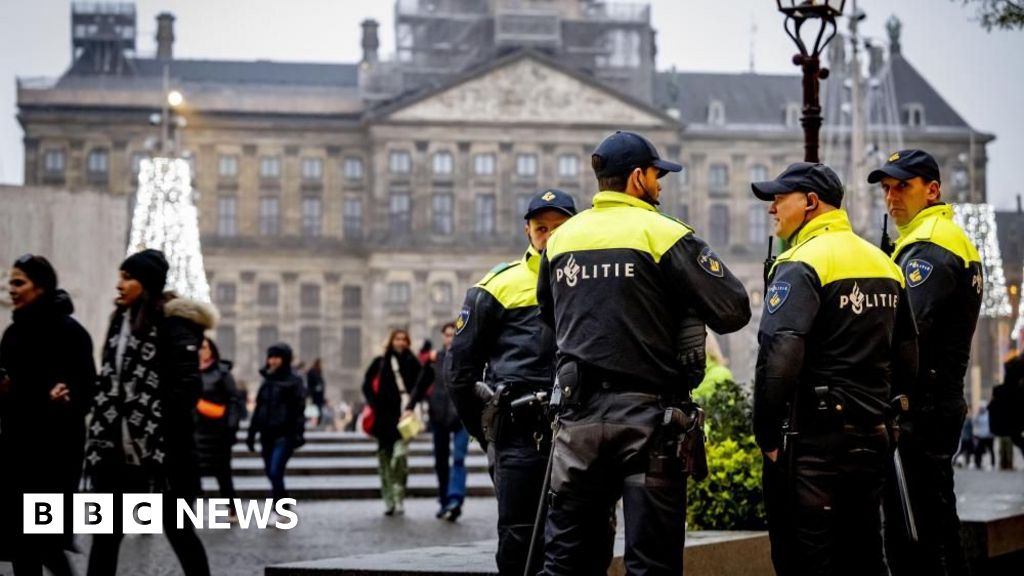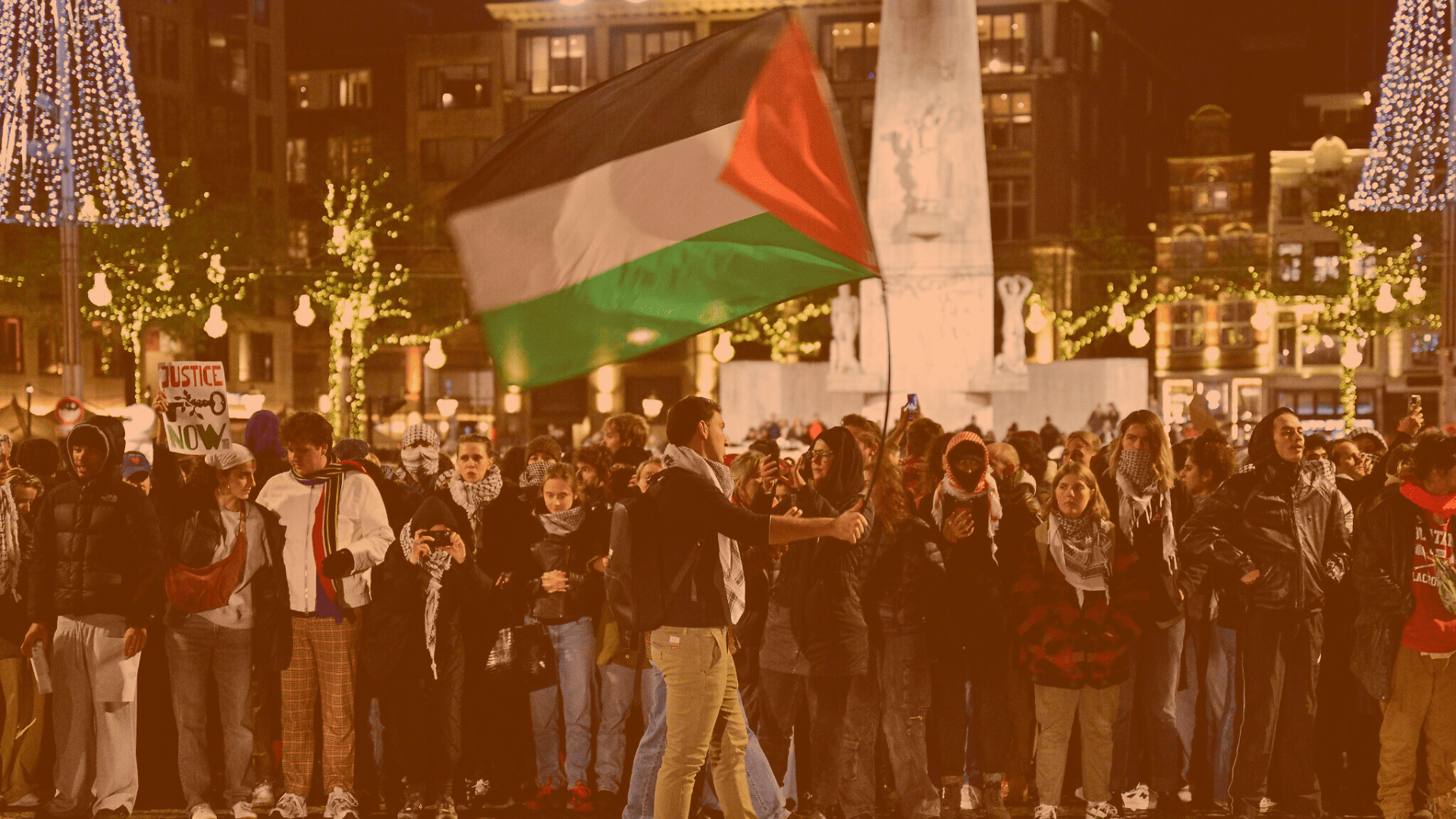(image credit: Tyna Le for Erasmus Magazine)
With the Gaza ceasefire fragile but holding, many continue to hope that the war is nearing an end. Its impact, however, extends far beyond the region. Around the world, and notably in the Netherlands, the conflict has sparked intense debate and division. As the country grapples with its stance on Israel and Palestine, tensions have spilled into the streets, universities, and even the courts, leaving a society increasingly at odds over one of the world’s most pressing humanitarian crises and troubling international legal issues.
With the much-anticipated truce that took effect on January 19th in the Gaza Strip, ending 15 months of intense fighting, a wave of relief was celebrated worldwide. The attack on Israel by Hamas on October 7, 2023 killed over 1200 Israelis, with more than 200 taken hostage. Israel’s military response has killed over 48,000 Palestinians, the overwhelming majority of them women and children.
However, this war is deeply rooted in a broader historical context — one of violence over religion, ethnicity, and land.
The Palestinian territory has been a contentious issue since the creation of Israel in 1948. The land known today as Israel was designated by England under the Sykes-Picot agreement as a homeland for the Jewish people, despite its majority-Arab population at the time. Since then, the question of which residents have the rightful claim upon the Holy Land has remained unresolved.
This long-standing dispute has fueled a series of conflicts, such as the Arab-Israeli War of 1948 and the Six-Day War of 1967, but none have matched the length and intensity of the recent violence.
The war in Gaza, amplified by extensive media coverage, has deepened the already-existing divide between pro-Israel and pro-Palestine supporters around the world.
Debates have raged over who bears more blame. For some, Israel’s response to Hamas’ attacks was a necessary act of self-defense. For others, a group that has grown as the war progressed, Israel’s actions have gone far beyond retaliation and amount to the systematic destruction of the Palestinian people — what many, including experts and world courts, call genocide.
In the Netherlands, the debate has raged loudly.
Dutch Society Reacts
Students across the Netherlands have shown overwhelming support for the Palestinian cause. Through street protests, campus sit-ins, and boycotts of businesses, student groups nationwide have voiced their disapproval of how Israel has handled the conflict. They have also urged universities to sever ties with Israeli institutions.
One location of protests has been The Hague, home to the International Criminal Court and the International Court of Justice, a global symbol of peace. The ICJ has determined that there is strong evidence of war crimes by Israel in Gaza, and the ICC has issued arrest warrants for Israeli Prime Minister Netanyahu and former defense minister Yoav Gallant.
But the protests have not been without controversy. Tensions have risen across the country, with incidents of vandalism, extremist rhetoric, and even police brutality, such as the violent interventions at Amsterdam University on May 13, 2024.
Critics of the pro-Palestinian movement accuse protesters of antisemitism, spreading hate against Jewish communities.
Most Pro-Palestinian activists will insist their fight is simply a call for justice for the people of Gaza. Many seek formal recognition of Palestine as a state, as Portugal, Ireland, and Norway have done.
Amid the ongoing conflict, there have been growing calls for Israeli Prime Minister Benjamin Netanyahu and his government to face international justice. South Africa filed a case against Israel with the International Court of Justice for war crimes and genocide.
Polarization and Hate Crimes
The conflict has had a profound impact on Dutch society. According to the OSCE’s Office for Democratic Institutions and Human Rights, Islamophobic hate crimes in the Netherlands surged by 58% in 2023, with 255 incidents recorded compared to the previous year. Antisemitic hate crimes also saw a sharp rise, increasing from 124 in 2022 to 231 in 2023.
For decades, the Dutch government, like most European states, has maintained a neutral stance on the Israel-Palestine issue. The Netherlands supports a two-state solution but has yet to recognize Palestine as a state.
The Dutch Ministry of Foreign Affairs has condemned Israeli settlements in the Occupied Palestinian territories, but also denounced Hamas’ acts of terrorism, framing its position within the bounds of international law. While affirming Israel’s right to self-defense, the government has emphasized the need for actions to be “necessary” and “proportionate,” and it has stressed the importance of humanitarian aid for Gaza’s residents.
But the Netherlands’ long-standing military ties with Israel have come under scrutiny. Dutch NGOs have sued the government for failing to prevent the alleged genocide, asking that the government be forced to halt arms export to Israel. The bid was rejected by a Dutch court.
Wilders’ Controversial Stance
Even before the war began, a majority of the Dutch population believed that an apartheid system existed in the Occupied Palestinian territories, according to a report by PAX. Despite this sentiment, Dutch voters overwhelmingly supported Geert Wilders and his anti-Islam Party for Freedom in the 2024 parliamentary elections.
Wilders has drawn criticism for suggesting that Palestinian refugees should be relocated to Jordan, a country he has controversially referred to as Palestine. His remarks have been condemned by Jordan as racist and by the Palestinian Foreign Ministry as escalating aggression against Palestinians.
The far-right leader is known for his anti-immigration rhetoric and harsh criticism of Islam, including past insults directed at the Quran and the Prophet Muhammad. His election aligns with a broader trend of far-right parties gaining ground across Europe and beyond.
The Bigger Picture
The future remains uncertain for Israel and Palestine. In the Netherlands and beyond, the war deepened ideological divisions. Recently, Donald Trump expressed a rhetoric similar to Wilders, suggesting the deportation of Gazans in order to transform it into a “Middle East Riviera” under U.S. control—an idea that has sparked outrage.
What is certain is that, even in its pause, the conflict has left a lasting imprint on global societies. As polarization grows and international leaders weigh their next moves, the manner in which nations and their people respond will shape the trajectory of not just the region, but global politics and international law.



